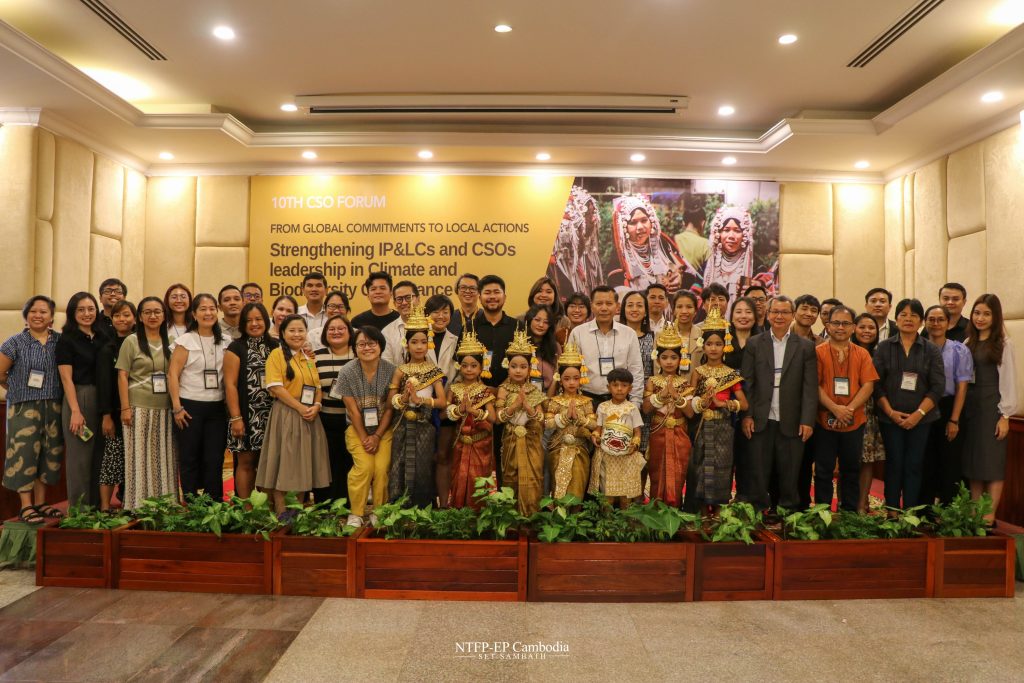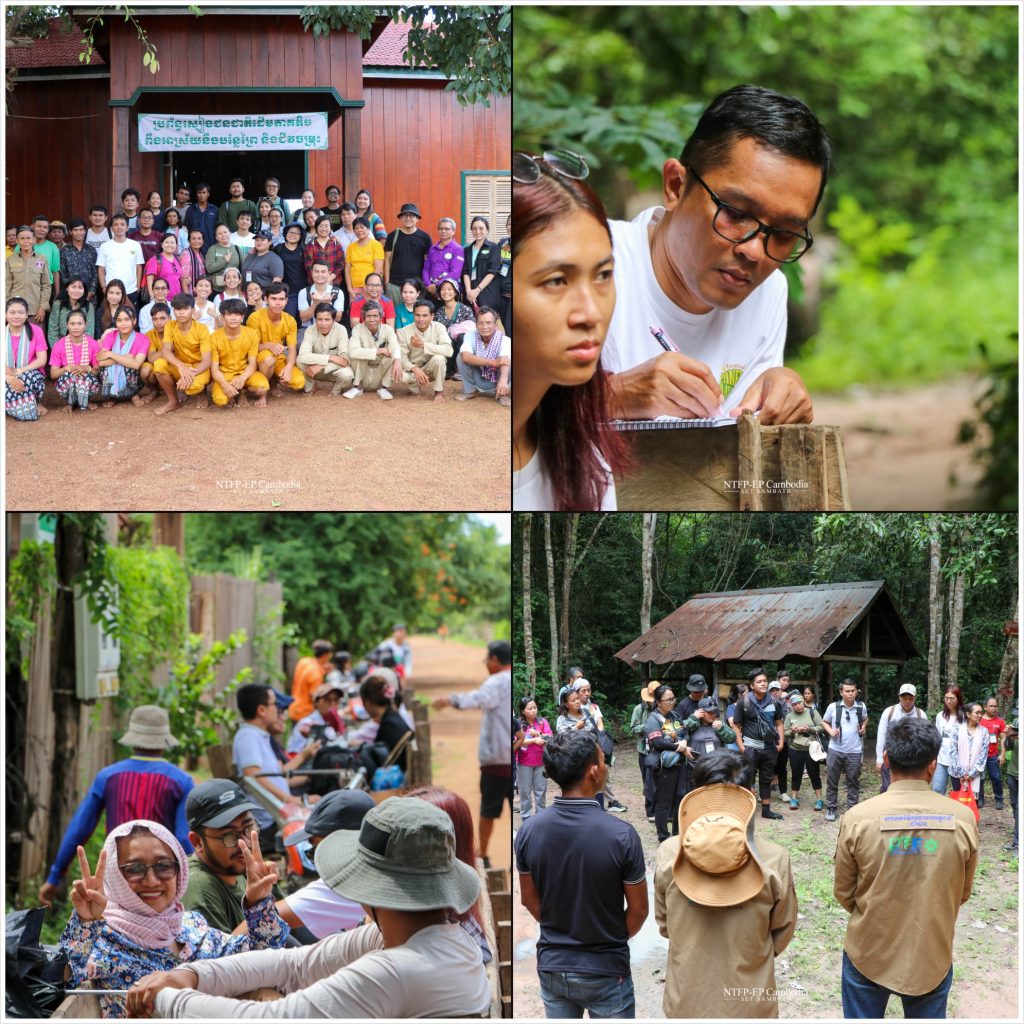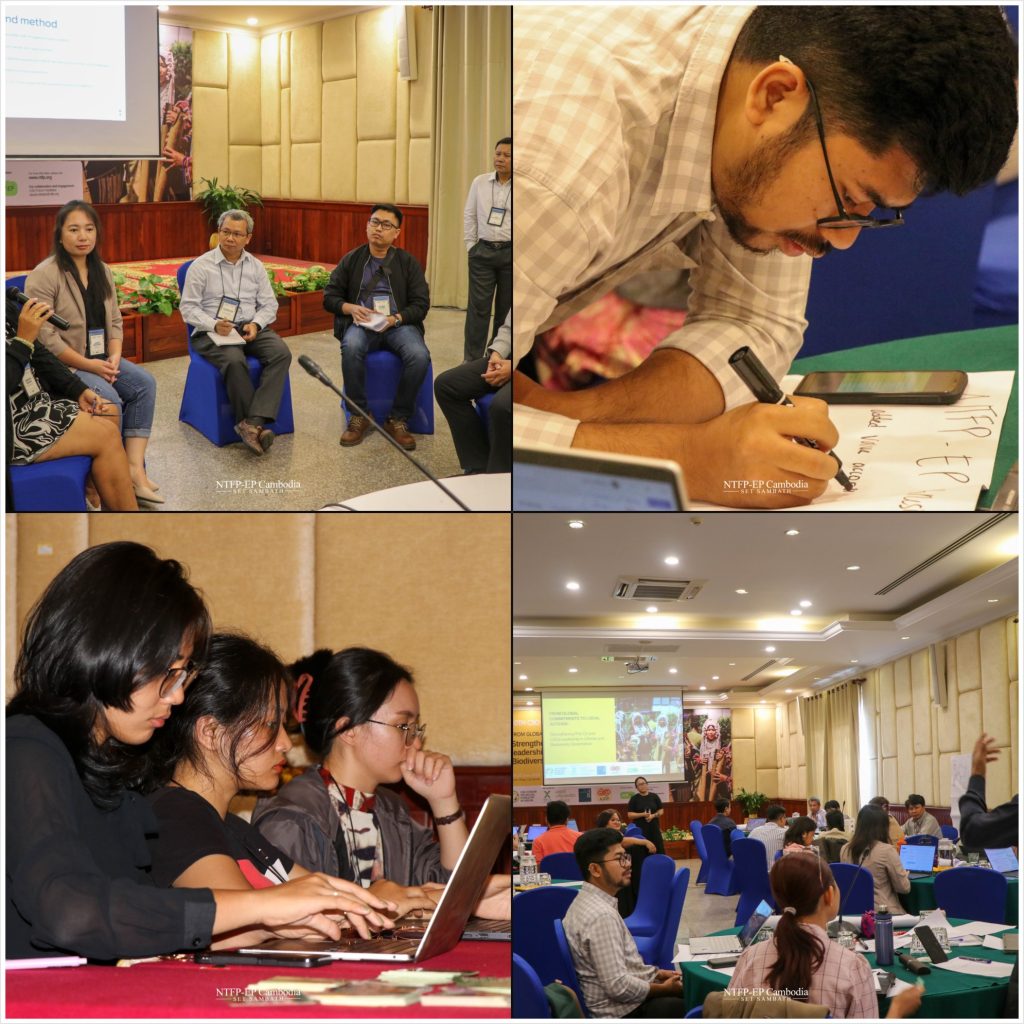Network of Civil Society Organizations, Indigenous Peoples, Local Community representatives tackled climate, biodiversity, and tenure for its 10th annual meeting
By Marie Giselle Dayan and Airi Gavan, with contributions from Michelle Lapiz and Dazzle Labapis

Considered as a milestone gathering, the 10th CSO Forum on Social Forestry in ASEAN convened in Siem Reap, Cambodia, from June 25-27, 2024, to address triple critical issues of climate change, biodiversity loss, and inequality in land access and tenure. The theme for this year’s annual gathering is “From Global Commitments to Local Actions: Strengthening IPs&LCs and CSOs Leadership in Climate and Biodiversity Governance.” Forty-five participants representing 31 organizations from civil society organizations, community-based organizations, Indigenous People’s network, and support partners from eight (8) Southeast Asia regional countries participated in the event.
The forum addressed the need for a transformative approach, genuine inclusion, and equitable and meaningful engagement of the IPs&LCs alongside CSOs in the local, national, regional, and global policy movement, focusing on the climate and biodiversity’s welfare and influence on the territories of life and the life those most at risk biodiversity loss and climate change. The forum also recognized that, while IPs&LCs are among the most vulnerable to biodiversity loss and climate change, they are also at the forefront of environmental stewardship.
Paving the implementation path toward global discussions at COP29 Climate Change and COP16 Biodiversity
The forum kicked off with learning sessions focused on the upcoming UNFCCC COP29 that is set to happen in Baku, Azerbaijan. Participants delved into the significance of tenure rights and explored avenues for meaningful engagement. The Kunming-Montreal Global Biodiversity Framework (KM-GBF) took center stage, discussing how CSOs could actively shape its implementation. The spotlight focused on the role of CSOs in bridging Indigenous Peoples and Local Communities (IPs&LCs) to strengthen connections from local actions to global goals during the Biodiversity COP16. As Dr. Van Hai Nguyen, researcher at Wyss Academy for Nature emphasized, “We face many challenges, but don’t wait…Innovative actions are needed to navigate crucial interactions across scales, innovatively like tapping local governments and domestic sources of citizens.”

Engaging Communities in Biodiversity Governance (Photo courtesy of Seth Sambath/NTFP-EP Cambodia)
Immersion in Bangkaeun Phal Village
The second day saw participants embarking on a field visit to Bangkaeun Phal Village, nestled within the Champen Community Protected Area. Here, they were given a unique opportunity to engage and meet the Indigenous Kui people who are managing and protecting a vast expanse of 3,422.74 hectares of ancestral land. The village visit was more than an observation—it was an immersion into their culture. Ritual ceremonies initiated the day, followed by vibrant cultural performances by the Indigenous Youth. As they explored the managed forest and local tourism area of the Indigenous Peoples, and an open dialogue with the village elders and leaders, CSO forum participants gained a better understanding of the village, their unwavering commitment to preserving customary tenure, use natural resources sustainably and Indigenous knowledge systems and practices (IKSPs) in order to live harmony with nature.
Lakpa Nuri Sherpa from Asia Indigenous Peoples Pact (AIPP) concisely pointed out, “most unprotected people are in protected areas.” The Kui community’s success story lay in the collective efforts of men, women, and youth who patrolled ancestral lands, safeguarding them against threats. Yet, concern about cultural identity loss loomed, prompting efforts to mobilize youth to learn their traditions, and take on leadership roles in forest management and biodiversity conservation.

Field Visit to Bangkaeun Phal Village (Photo courtesy of Seth Sambath/NTFP-EP Cambodia)
Synthesis, Action Plans, and Regional Context
The final day provided a platform for reflection and synthesis. Participants shared insights gained from the previous days, culminating in a plan of action. Learning sessions centered on the ASEAN Customary Tenure Guidelines (ASEAN CT Guidelines) and the Regional Free, Prior, and Informed Consent (FPIC) Handbook, exploring their potential impact on climate and biodiversity commitments. Resources speakers updated attendees on the draft ASEAN Declaration on Environmental Rights. Using their experience in their respective country work, and the knowledge and experience gained from each of the learning sessions and field visit, CSO Forum participants took the time in developing regional and country-specific strategies and action plans, highlighting National Determined Contributions (NDCs) and National Biodiversity Strategies and Action Plans (NBSAPs). Entry points for meaningful CSO and IPs&LCs engagement were identified, along with potential collaboration opportunities at regional and country levels. Roger Garinga, Executive Director of the Institute for the Development of Educational and Ecological Alternatives (IDEAS) emphasized, “there are different local contexts, and we need to bring these to higher platforms so we can deal better with our local governments.”
Embracing diversity, IPs&LC should play a leadership role in determining their own development path in harmonizing with their surrounding nature and coping with changes. Their local knowledge equips them with experiences and expertise to ‘bricolage’ (do-it-themselves) practical and from ground policy solutions that truly work.

Engaged discussions and Active Participation (Photo courtesy of Seth Sambath/NTFP-EP Cambodia)
Key Statement: Advocacy and Reference Material
To encapsulate the forum’s agenda, participants collaboratively created a key statement with policy recommendations. This document, reviewed and affirmed by all, serves as a valuable advocacy resource. Leveraging it, CSOs and IPs&LCs can elevate their voices on regional and global platforms, including the ASEAN Group on Social Forestry, UNFCCC, and UN Convention on Biological Diversity (UNCBD). As Femy Pinto, Executive Director of NTFP-EP Asia highlighted, “we are growing from an NGO working on social forestry space to unifying plans from the ground and coordinating with each other. Combining alliances is our way forward.”
In this dynamic convergence of global vision and local action, the 10th CSO Forum reaffirmed the critical role of IPs&LCs and CSOs in climate and biodiversity governance. Their commitment echoes across the lush landscapes of Bangkaeun Phal Village and resonates in policy corridors worldwide. Together, they forge a sustainable path toward the harmonious coexistence of people and nature.
Paving the Path for Collective Impact
The event transcended geographical boundaries, uniting passionate individuals—Indigenous Peoples, local communities, and civil society organizations. As we reflect on the forum’s insights, we recognize that transformative change begins with inspiration and collective effort. Lakpa Nuri Sherpa’s words resonate, “…[you] don’t doubt the capacity of Indigenous Peoples [and Local Communities].” Indeed, their wisdom, their vision, and resilience fuel our shared journey toward a sustainable future.
The 10th CSO Forum meeting was made possible with support from the Mekong Region Land Governance (MRLG), Green Livelihoods Alliance (GLA), Wyss Academy for Nature, and the Asia Indigenous Peoples Pact (AIPP). With special thanks to NTFP-EP Cambodia and Cambodia Indigenous Peoples Organization (CIPO).



